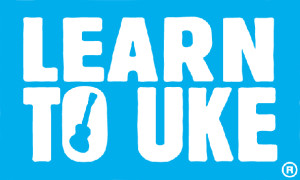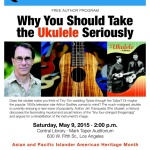Someone asked me lately: “Is the ukulele just a fad? Are people getting bored with it now?”
I replied: “Is the cup of tea a fad? Are people getting bored with it now?”
OK, that may have been a tad on the facetious side but it got my view across very quickly, without me having to explain my reasoning or feelings about the issue. Since you’re here now, and I’m feeling a bit more reflective and maybe even a bit serious, I’ll tell you instead.
In short, no. I don’t believe that the ukulele is a fad. Yes, it’s experienced something of a renaissance in recent years, but I believe that the ukulele is an inclusive instrument, which allows impatient people like me to play a song they know within an hour, rather than having to spend years becoming accomplished enough to make a song sound familiar to others. I believe that the ukulele is a wonderful first instrument. It opens music up to those who believe that they are ‘unmusical’ (I don’t believe that anybody is unmusical, only that some people are more encouraged and then become more committed in their childhood) since millions of adults didn’t benefit from a good musical education in childhood, many of them yearn to be able to play something, but lack the time to spend years catching up with people who began piano or guitar as children. Many adults want to play an instrument and participate in a song with others quickly. The ukulele gives them that. It should stay firmly on the musical map.
The ukulele was my first instrument. For a few years it was my only instrument. Without it I’d be a mere consumer of music, instead of a participant. Nowadays, my very being and sense of self is based upon playing music. My existence before I was able to play anything was unfulfilled and sad. OK. That’s not technically true, but there is a nugget of truth in it. I feel that I’ve grown as a person through learning and committing to music, and that love would never have flourished without the ukulele. The seed was planted and now my life is very different. Whilst not everyone has the same experience that I did, most people find playing and singing with others therapeutic.
Ukulele Wednesdays, and then Learn To Uke’s very success is based on group ukulele playing and singing. I think that meeting up and playing ukulele in a group is a great thing. It’s a way to spend time with others, make music, forget about everything else and relieve stress. I believe that somewhere, very deep within the human psyche we have a need to play and sing with others. It’s ethereal and can take you off to another place, even if it does sound somewhere between a football chant and a cockney knees up at times. The point, is not to be the next One Direction, but to connect with others in a fundamental way. Years ago, people used to sing together frequently, whether they were; at Irish gatherings, the folk drop ins where lots of people bring an instrument and join in, or at Church, or around the piano with the family at home. It was a way of life that isn’t seen often today, and I think our collective consciousness needs it. I don’t see any other instruments bringing as many people together so inclusively, so I feel that there should always be a place in our society for ukulele playing and singing. It’s a pity that it has been overused by advertisers, and the media. I hope that it has been, or does become realised as a seriously inclusive instrument, fun to play in a group with others and is not dismissed as easily as Jedward hair.



